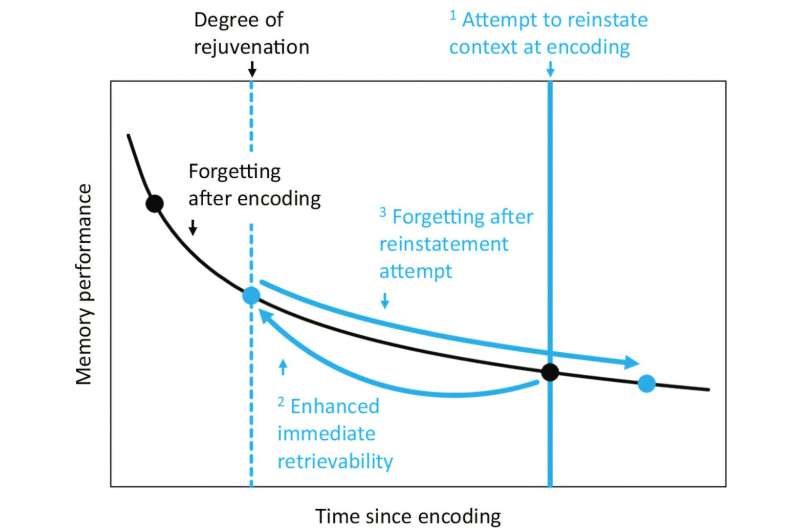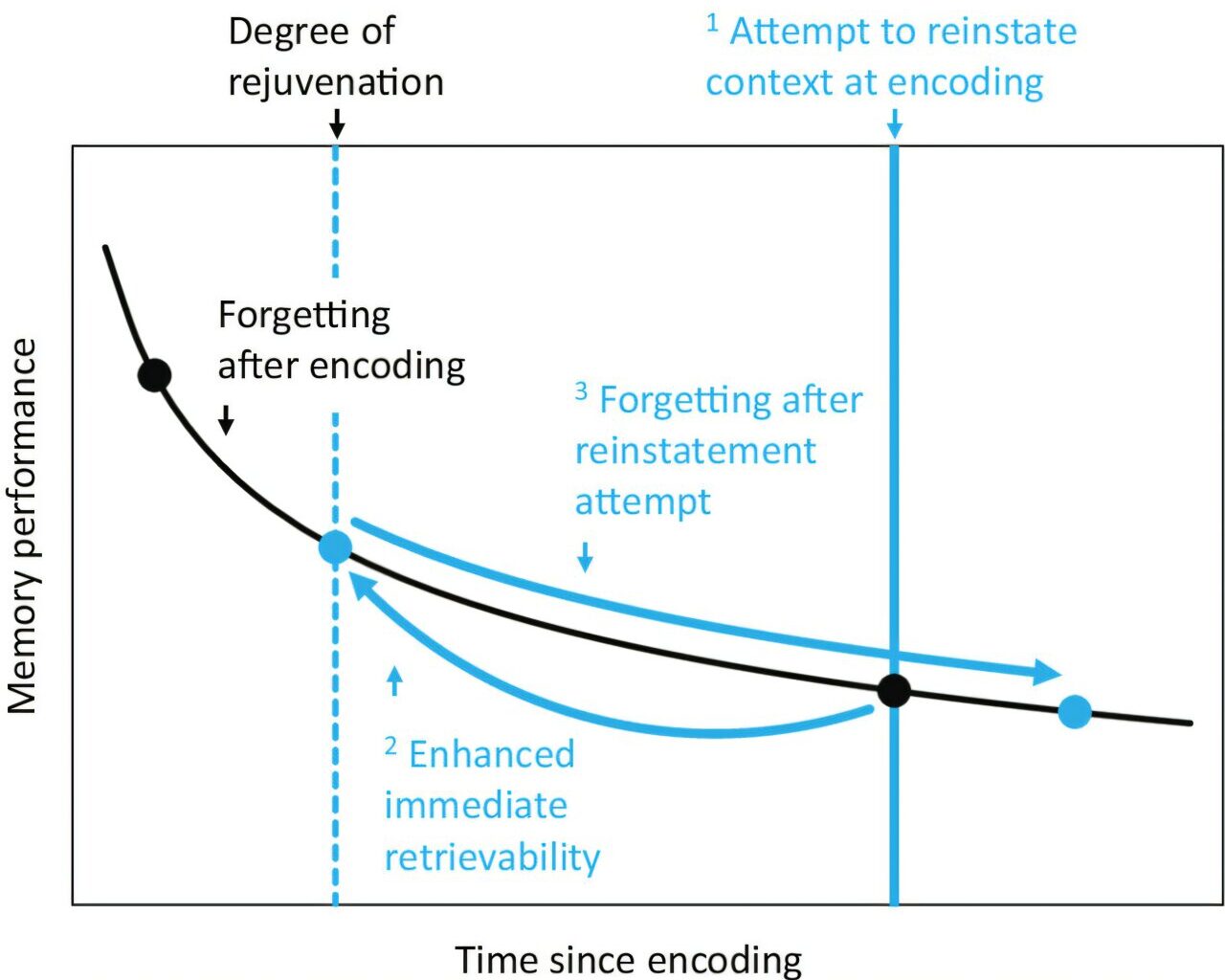
The rejuvenation hypothesis. Credit: Proceedings of the National Academy of Sciences (2025). DOI: 10.1073/pnas.2505120122
Several studies have indicated that forgotten memories may not be as irretrievable as once thought. Memory appears to be closely tied to the context in which it was encoded. Consequently, remembering smells, sounds and other environmental cues, as well as any feelings experienced during the time the memory was formed can help to recall the memory. However, these memory studies have not sufficiently determined how this kind of contextual memory recall is forgotten after recall.
As most people are aware, retrieving a memory normally becomes more and more difficult as time goes on, but the rate of forgetting actually declines over time in a nonlinear manner due to ongoing memory consolidation. In other words, humans will forget an event at a faster rate within the first few days or weeks, and then the forgetting levels off somewhat and less of the memory is lost over longer time periods.
In a new study, published in the Proceedings of the National Academy of Sciences, a group of German scientists sought to determine if retrieving memories with “mental time travel” can restore the retrieval and forgetting rate to how they were shortly after encoding. To do this, they recruited 1,216 participants to undergo two different memory experiments.
The participants were split into four groups for each experiment. In the first experiment, the groups were tasked with remembering a word list, and in the second experiment, participants were given a passage to read. One group from each experiment was asked to recall the material without any form of mental time travel—or context reinstatement. The other groups used context reinstatement by recalling their thoughts and feelings during encoding and were asked to recall the materials at different times, either 4 hours, 24 hours or 7 days after initially learning the materials.
The scientists expected to see a kind of rejuvenation of the memories. “The rejuvenation hypothesis assumes that mentally traveling back to the time when the older memories were originally encoded reverses these effects: It enhances the memories’ retrievability immediately after the mental time travel as well as their future rate of forgetting, effectively creating a copy of how the memories were at an earlier point in time.”
And that is essentially what the experiment revealed. The researchers found that the participants’ forgetting trajectory after context reinstatement reverses course and closely matches the original forgetting curve right after the memory was encoded, but this didn’t occur with the participants who did not use the mental time travel methods.
However, this method was more effective when the time lag between memory encoding and reinstatement was shorter, at 4 or 24 hours, compared to the longer time lags of 7 days. The likelihood of reinstating the memory through context reinstatement and the proportion of the memory reinstated diminished at longer time intervals.
The study authors liken the idea of memory resurrection to the myth of Sisyphus rolling his boulder up a hill, only for it to fall back down again. They say, “The reversal made the memories similar again to how they were at an earlier point in time, with forgetting after mental time travel following the very same trajectory as forgetting after encoding.
“This picture of a Sisyphus-like resurrection of memories contrasts with the idea that context reinstatement as induced by mental time travel is a transient contextual phenomenon. If transient in character, the induced enhancement effect should have vanished shortly after the reinstatement attempts, and the memories’ retrievability quickly become indistinguishable from the retrievability when previous reinstatement attempts were missing.”
The study offers some hope that old memories can be reinstated, but there are some differences between memories made in real life and those used in this experiment. It is possible that the richer, real-life contexts in which memories are often made may yield stronger rejuvenation effects, but more research is needed to determine how this effect may be different outside the lab and whether some memories might be rejuvenated after longer periods of time.
Written for you by our author Krystal Kasal,
edited by Lisa Lock, and fact-checked and reviewed by Robert Egan—this article is the result of careful human work. We rely on readers like you to keep independent science journalism alive.
If this reporting matters to you,
please consider a donation (especially monthly).
You’ll get an ad-free account as a thank-you.
More information:
Karl-Heinz T. Bäuml et al, Reinstating memories’ temporal context at encoding causes Sisyphus-like memory rejuvenation, Proceedings of the National Academy of Sciences (2025). DOI: 10.1073/pnas.2505120122
© 2025 Science X Network
Citation:
‘Mental time travel’ can restore memories to their former state, new study finds (2025, July 29)
retrieved 30 July 2025
from https://medicalxpress.com/news/2025-07-mental-memories-state.html
This document is subject to copyright. Apart from any fair dealing for the purpose of private study or research, no
part may be reproduced without the written permission. The content is provided for information purposes only.
